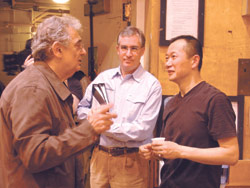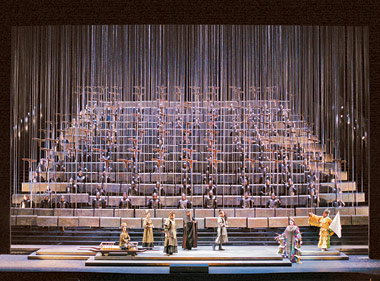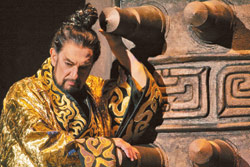| Tools: Save | Print | E-mail | Most Read |
| How the West Was Won ... or Not |
| Adjust font size: |
Academy Award-winning composer Tan Dun moves East and West closer than ever before through his epic opera The First Emperor. It is the first time a pantheon of Western opera, such as New York's Metropolitan Opera, have commissioned a Chinese composer for an original work. Tan spent 10 years developing the work and hired a predominantly Chinese creative team and arguably the greatest singer on today's opera stage Placido Domingo. However, The New York Times led the critical assault. The very influential classical music critic, whose reviews can make or break the average work, did not hold back: "Tan's score is an enormous disappointment, all the more so because whole stretches of it, and many arresting musical strokes, confirm his gifts." The Baltimore Sun says it is "visually spectacular, often engaging, and not entirely successful". The AP critic says it is "fascinating but flawed", however others have called it "spectacular, dramatic and musically inventive". Tomorrow the opera will be broadcast via high-defination audio and video to selected movie theaters worldwide. The opera is set to be staged in Beijing during the 2008 Olympics if discussions between the Met and the Beijing Gehua Culture Development Group are successful. The co-director
The team used the same elements "ropes and bricks" to create a variety of scenes, including the imperial palace and the Great Wall. The idea of a two-dimensional space fascinated them, says Wang. They were guided by the quintessentially Chinese aesthetic notion of xieyi, a form of expressionism that hints at something larger rather than attempting to recreate it, according to Wang. Wang and big-name movie director Zhang steered clear of such Chinese symbols as red lanterns, because, they represented folk art while this opera has an imperial setting. The set is also far removed from Hero, Zhang's movie about the same emperor. "We often bandy about ideas and argue over them, a healthy way of finding imaginative ideas," says Wang. The trio of Zhang, Wang and Fan has collaborated on several stage projects, mostly singing and dancing revues at popular tourist sites such as Guangxi's Guilin, Yunnan's Lijiang and Zhejiang's Hangzhuo. "These projects make use of what nature has to offer and tend to be in broad stroke in expression whereas The First Emperor is a totally original stage work that demands visual innovation," she says. Even actors have a big say in shaping the characters. Placido Domingo was not convinced by the directors’ conception of his character, instead he sees the emperor more as a man and a father. "This opera production may appear to be Chinese to the Western eye, but it is not authentically Chinese," notes Wang, "rather it is avant-garde and international in nature.? The critic Following a request by the China Daily to elaborate on his criticisms, The New York Times classical music critic Anthony Tommasini published another piece this week on January 11. Here is an excerpt: The opening scene did not disappoint. As the orchestra emitted an ominous, swelling tremolo, Wu Hsing-Kuo, a riveting singer from the Peking Opera tradition, playing the Yin-Yang Master, began telling the story of Qin. A battery of percussionists pounded ferocious rhythms on Chinese drums. Long-time Met-goers must have thought that such exotic sounds would never come from that hallowed stage. Alas, once Placido Domingo as Emperor Qin appeared, the Chinese musical elements were overwhelmed by long stretches of tedious neo-Puccini, pentatonic lyricism. There were some compelling instrumental episodes evocative of Mr Tan's pulsating, Oscar-winning film score for Crouching Tiger, Hidden Dragon. But whole spans of the opera seem to float in some nowhere land between a martial arts film fantasy and Turandot. The score could be taken as a cautionary lesson about the challenges of combining music from different cultures. There seems to be an assumption today that the blending of Eastern and Western musical traditions is intrinsically interesting. Is contemporary Western opera in trouble? Just inject a jolt of Asian music. Sounds good, except it depends on who is doing the mixing. For example, the Chinese-born American composer Chen Yi has created a body of work that draws from both traditions. But she is a formidable composer, a true modernist with an acute ear and keen imagination. Then there is Yo-Yo Ma's Silk Road Project, a bold and timely venture to explore the interconnections of Asian, Central Asian and Western culture along the historic Silk Road trading routes. Though some genuinely intriguing new works have been created, the project has also generated compositions with little to recommend them aside from atmospheric colors and mystical allure. The composer
Tan says previous revolutionary efforts in the arts "smashed" traditions, but his grand opera inherits the mantle of tradition and extends it, both the tradition of classical Western opera and the Eastern dramatic heritage of Peking Opera and Japanese Kabuki, among others. Yet, he is confident his work is "unprecedented" in several ways. It is avant-garde because it uses multi-style counterpoints and contrasts of romantic and percussive, modern and classical and East and West highlighted by the daring combination of "chromatic and indeterminate pitch? "I'm rooted in Chinese culture and also well versed in Western civilization, which are vast terrains of soil that both nourish and evolve," he says. "I started my music education with Peking Opera, and I also have great interest in contemporary philosophy, poetry and painting. I absorb both the domestic and foreign, the old and the new." The second breakthrough, he contends, is in the "operatic language? "I tend to use more simple, lyrical music for the voice, but make the orchestration complex and dramatic," he says. "An opera is about drama, it has to have ups and downs. If it is slow and lyrical from beginning to end, it would be too saccharine and boring." Addressing unfavorable comparisons to his award-winning score for Crouching Tiger, Hidden Dragon, Tan explains that a film score has to serve what is on the screen "the dialogue, the image and the story" while an opera has to stand on its own as drama. "It is ludicrous to expect something like Crouching Tiger, a mainly instrumental piece, from The First Emperor." The third creative aspect that Tan says he has brought to opera is the "operatic structure? He has removed the Western practice of recitatives, the speech-like singing, which he says is too far removed from the taste of present-day young and ethnic audience. Of the 36,000 tickets sold for this run of The First Emperor, about half were snatched up by what he calls a "multi-audience? skewing towards a younger demographic. Tan also experiments with "concert within an opera" and interludes that, with the curtain down, the orchestra not only plays but also adds ritualistic chanting, receiving full spotlight. "It's like in Peking Opera, when the band takes over the story-telling to bridge the visual pause and add another dimension to the drama. Audience applause for the Met orchestra confirms the new role of the pit," he says. And then is the path-breaking blending of languages and performing conventions. There are two characters in the opera that do not participate in the plot: One is a feng shui master who sings in Chinese, in the Peking Opera wusheng style, and uses more body language, and the other is a shaman played by a mezzo-soprano who makes her observations in English-language arias. "They are actually two sides of one person. Music brings them together, and they are here to deliver a philosophical message, and it's a message about culture," clarifies Tan. "I'm a product of multi-cultural attitudes. Although New York is the capital of multi-cultures, it is not devoid of prejudice or discrimination. "The development of multi-culture and the future of classical music lie in bridging the divide of both old and new, East and West, and tradition and innovation. "One person cannot do it alone. It'll take several generations. But I'm making my efforts," and he is confident because audience reaction to his work has been much better than that of media critics." Tan justifies that there are "three types of critics" those who are sincere and those who are prejudiced, and in the middle is the category for those who are not narrow-minded but limited in knowledge. However, press reviews have turned from mixed to generally positive as more critics come to the recent performances, he says. One criticism he accepts wholeheartedly is the length. "It needs trimming. Actually, we're doing it for every performance. As the show gets shorter, the standing ovation at the end is getting longer. It now lasts 20 minutes," Tan laughs. The actual opera, after nips and tucks, now stands at 2.5 hours, "hardly long for an operatic experience" Tan is confident that his opera will stand the test of time. "Puccini or Stravinsky are my icons. During their day, a new work made ripples within the realm of European culture. "Nowadays, with globalization, The First Emperor is having impact worldwide right after it comes out. That is good for opera. And I want my opera to grow with me and be the mirror to the soul of our time." The singer
"This is a major bass role, and the Met is one of the best opera houses in the world," says Tian, who has more than 50 roles under his belt. He admits that Western audiences may feel The First Emperor is "foreign" to them, but opera, a Western art form, has a future to accommodate the fusion of multi-cultures. "It is an opportunity to let people here know more about Chinese culture and history through the medium of music and drama," he answers from New York, where he is also preparing for Verdi's Nabucco. Tian adds that The First Emperor is getting very good word of mouth. Audience reaction gets warmer with each performance, he notes, and when composer and conductor Tan Dun comes on the stage after each show, the standing ovation he receives is just as thunderous as that accorded Placido Domingo, superstar tenor who sings the title role. Tian feels that First Emperor has more lucid and beautiful melodic lines than Marco Polo, Tan's previous operatic outing. But opera audience is a special lot, he maintains, as they are not a majority in any society. The critical brouhaha surrounding Emperor has made him ponder the standard of a good opera. "Which is better, an opera with one hummable aria, or one that impresses and moves as a whole" But he asserts that a little controversy is the manifestation of vitality of a piece of art work. Puccini's Madama Butterfly was not a triumph when it premiered, he remarks, and it went through many revisions before it assumed classic status. "You have to give a new opera time and room to grow. A good opera takes more than one listening or watching. One has to be open-minded and be willing to embrace it and feel it," he suggests. Whatever people say about this opera, it is a historical milestone in cultural coalescence. It is the first "grand, modern Chinese opera" to be staged in a world-class house. Later this year, Tian will star in another world premiere, Poet Li Bai, in Colorado. Unlike Emperor, that will be a smaller-scale "chamber opera" and he will sing the title role. "This is an unbelievable time," he enthuses, "and I'm very proud and excited." (China Daily January 12, 2007) |
| Tools: Save | Print | E-mail | Most Read |
 |
| Related Stories |
|


